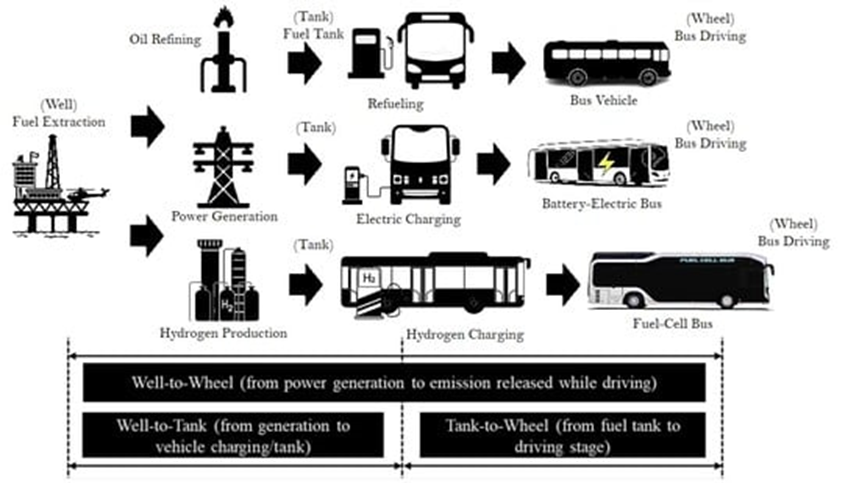Energy and Environmental National Assessment of Alternative Fuel Buses in Morocco
This study provides a national-level environmental life cycle assessment of alternative buses in Morocco.

Graphical abstract
The heavy reliance on petroleum-based fuels in the road transport industry, especially public transportation, results in substantial emissions of greenhouse gases. A significant obstacle on the path to a more sustainable public transportation sector is the employment of alternative fuels with lower environmental implications. Although there are several in-depth well-to-wheel studies for developed countries, extrapolating those results to gasoline markets in developing countries presents challenges because of significant differences in local fuel conditions and vehicle engine technologies. Notably, this study provides a national-level environmental life cycle assessment of alternative buses in Morocco and compares current diesel buses to potential hybrid diesel-electric buses, battery-electric buses, and fuel-cell buses from a well-to-wheel perspective. The model and approach used in this study applies to other countries with developing economies. Total energy consumption broken out by fuel type, greenhouse gas emissions, and criterion air pollutants is the primary outcome of this investigation. Findings highlight an energy cut of 44.7% from battery-electric buses, 36.3% from fuel-cell buses, and 31.7% from hybrid buses with regard to the current diesel buses. Additionally, alternative fuel buses proved to be less polluting in terms of greenhouse gas emissions with 50.8% less from battery-electric buses, 46.7% less from fuel-cell buses, and 26.8% less from hybrid buses; consequently, this would lead to reduced climate change, air pollution, acidification, and eutrophication, given the Egalitarian Environmental Impact Assessment. Ultimately, Morocco will have to tackle technological, financial, and institutional barriers to fully implement the change by 2030.
Authors: Hamza El Hafdaoui, Faissal Jelti, Ahmed Khallaayoun, and Kamar Ouazzani
In the same category
- A Smart Battery Management System for Electric Vehicles Using Deep Learning-Based Sensor Fault Detection
- Autel Energy Europe at AEC 2024: Pioneering the Future of Ultra-Fast EV Charging
- Baden-Württemberg International: Your partner for a successful expansion
- Business Region Goteborg : Gothenburg - Pioneering tomorrow's mobility
- Charging Electric Vehicles Today and in the Future
- Comparative Study of Permanent Magnet, Conventional, and Advanced Induction Machines for Traction Applications
- Design Methodology and Circuit Analysis of Wireless Power Transfer Systems Applied to Electric Vehicles Wireless Chargers
- Designing High-Power-Density Electric Motors for Electric Vehicles with Advanced Magnetic Materials
- Energy and Environmental National Assessment of Alternative Fuel Buses in Morocco
- Energy Management and Optimization of Large-Scale Electric Vehicle Charging on the Grid
- Fuel Cell Hybrid Electric Vehicles: A Review of Topologies and Energy Management Strategies
- Numerical Simulation of Cooling Plate Using K-Epsilon Turbulence Model to Cool Down Large-Sized Graphite/LiFePO4 Battery at High C-Rates
- Using an Intelligent Control Method for Electric Vehicle Charging in Microgrids
- Will Utrecht become the world's first bidirectional city?